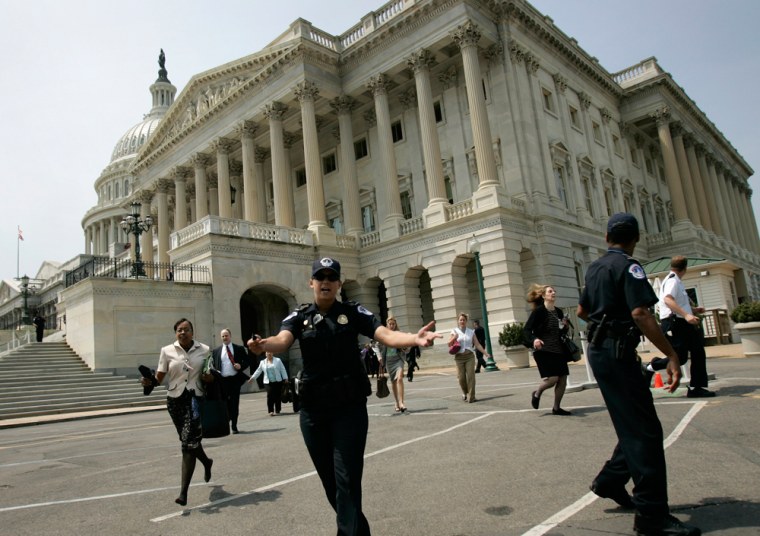WASHINGTON — The Coast Guard is close to becoming the chief protector of the airspace over the nation’s capital MSNBC.com has learned.
The Coast Guard would take over from the civilian Customs and Border Protection, or CBP, which currently has primary responsibility for the nation's airspace.
“Our understanding is that discussions are still continuing between Department of Defense and the Department of Homeland Security,” Lt. Cmdr. Jeff Carter, a Coast Guard spokesman, said on Friday. “No decisions have been made yet. There are proposals but those are at the departmental level.”
However, three Department of Homeland Security sources told MSNBC.com that the Coast Guard would assume responsibility for protecting the capital's airspace on Oct. 1. Pilots, aircrews and other workers under Customs and Border Protection "have been told to plan on transitioning out effective Sept. 30,” one DHS source told MSNBC.com.
All three of the sources spoke on condition of anonymity because the change hasn't been officially announced.
Coast Guard 'jumped at' offer
The DHS sources told MSNBC.com that a week and a half ago department Secretary Michael Chertoff met with CBP Commissioner Robert Bonner and Coast Guard Commandant Adm. Thomas Collins to discuss the overall airspace security situation. At that meeting, Chertoff “offered the [national capital region] airspace security mission to the Coast Guard,” said one DHS source. “Collins jumped at it.”
The DHS sources said the Coast Guard would begin moving helicopters out of the Bahamas, where they currently fly drug interdiction missions with the federal Drug Enforcement Agency and their Bahamian government counterparts, as early as Monday to begin taking over the air security role from Customs' Black Hawk helicopters and Citation jets currently assigned to the Washington area.
A Coast Guard official in the Bahamas contacted by MSNBC.com on Friday declined to comment on any specific plans.
Too close for comfort
Airspace security around Washington came under intense scrutiny on May 11 when a private Cessna violated the 23-mile ring that makes up the restricted airspace encompassing Washington, D.C., and Baltimore. The single-engine plane, unable to communicate with any federal aviation sources, flew to within three miles of the White House and was in the cross-hairs of an Air Force fighter before turning away at literally the last second.
A month later a private prop plane came near enough to the White House and Capitol buildings to trigger the evacuation of President Bush and lawmakers. An Air Force fighter jet intercepted the plane and turned it back about eight miles from the Capitol.
“After the airspace incursion of May 11, we have been looking all up on how we manage the airspace security mission here in Washington, D.C., and we may have something here for you down the road,” DHS Deputy Secretary Michael Jackson told MSNBC.com Wednesday when asked about the possibility that the Coast Guard might take over the security role.
Coast Guard's dual role cited
One reason for offering the job to the Coast Guard is its dual role as a law enforcement and military organization. For example, the Coast Guard's responsibilities include U.S. port secuity and drug interdiction missions as well as supporting military operations; some of its assets were pressed into duty during the last Gulf War.
Currently, the Customs aircraft operate only in a law enforcement mode and are responsible for intercepting and trying to warn off errant civilian aircraft before they stray too close to White House airspace. In a crisis situation, as on May 11, the military ultimately takes over air security and would be responsible for shooting down any aircraft.
The Coast Guard's dual role would theoretically make it easier to take hostile action against an intruder. However, one DHS source questioned that notion, saying that the Customs Black Hawks could, if ordered, also fire on an errant plane.
Several DHS sources, including former Black Hawk crew members, questioned whether the Coast Guard, whose aircraft are primarily used in support of its maritime mission, is up to the job.
“The Coast Guard often decries the fact that they don’t have enough money to upgrade their equipment; now they want to take on a new mission which they haven’t trained for and don’t have a budget to support?” said one DHS source.
Modernization program
Last year the Coast Guard's Collins told Congress that his No. 1 priority was to modernize the agency's aging and technologically obsolete aircraft, boats and cutters. "Our legacy systems are wearing out at a much faster rate then their current rate of replacement," he said at the time. "From my perspective, this is the greatest threat to continued mission performance."
On Thursday, Collins will give Congress a progress report on upgrading the agency's fleet.
The changing security roles come at a time when Customs and Border Protection itself is moving to consolidate its aviation resources under one office “in what will be the largest federal air force outside of the Department of Defense,” said CBP Commissioner Bonner in an internal e-mail announcing the consolidation plan; the e-mail was obtained by MSNBC.com on Friday.
The consolidation will create what Bonner calls “CPB Air.” The consolidation begins immediately and will be complete by Oct. 1, Bonner’s e-mail says.
The e-mail makes no mention of relinquishing agency airspace security role in Washington to the Coast Guard.
